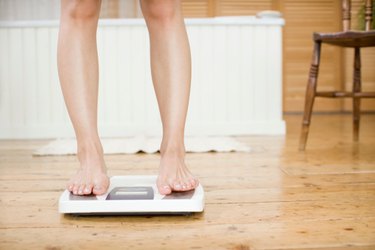
Often asymptomatic and unproblematic, the condition of diverticulosis is characterized by abnormal pockets in the large intestine. Occasionally, the condition does produce negative symptoms, such as abdominal pain and abnormal weight loss. Although weight loss with diverticulosis is not common, the side effect can be avoided through correct diagnosis and treatment.
Anatomy
Video of the Day
Before understanding the disease, it is first important to understand the anatomy of the gastrointestinal system. The lower portion of the stomach attaches to a long tube called the small intestine. As food passes through the small intestine, it is mixed with various secretions and broken down into its essential elements. The food's nutrients are absorbed in the small intestine. The small intestine then attaches to the large intestine, also known as the colon. By the time food reaches the large intestine, it is considered waste. The function of the colon is to move wastes through the body and absorb small amounts of water and electrolytes. Once wastes reach the end of the large intestine, they move into the rectum for excretion.
Video of the Day
Diverticulosis
Diverticulosis affects the large intestine, or the colon. John Hopkins Medicine describes diverticulosis as a condition that occurs when small pouches bulge out through the intestinal wall. These pouches, known as diverticula, typically protrude out through weak portions of the lower large intestine. They develop as a result of increased pressure inside the colon, which places stress on the walls. These pockets often fill up with food wastes and occasionally become inflamed, causing a condition known as diverticulitis.
Weight Loss
Diverticulosis does not always cause weight loss. In fact, the National Digestive Diseases Information Clearinghouse explains that "most people with diverticulosis do not have any discomfort or symptoms." However, some people do report mild pain or discomfort in the lower abdomen accompanied by bloating and constipation. However, a severe case of diverticulosis might lead to more advanced health complications. As the condition worsens, it may also cause nausea, vomiting, diarrhea, constipation and blockages in the colon. When these symptoms develop, malnutrition and weight loss become increasingly more common.
Diverticulosis Diet
Patients with diverticulosis are typically prescribed a high-fiber diet to treat the condition. John Hopkins Medicine claims that "a daily intake of 20 to 35 g of fiber is generally recommended" for patients with the condition. When consumed, high-fiber foods make the stool easier to pass through the colon, reducing the pressure inside the colon. As a result, the abnormal pouches are less stressed and have an opportunity to heal. Foods high in fiber include wheat bran, beans, whole-grain breads and cereals, fruits and vegetables.
Considerations
In most cases, diverticulosis does not cause substantial weight loss. Although it is possible, the complication rarely occurs with this specific condition. However, the Chronic Fatigue and Immune Dysfunction Syndrome Association of America explains that "weight loss can be a side effect of any gastrointestinal disorder." Common gastrointestinal disorders include irritable bowel syndrome, Crohn's diseas, ulcerative colitis, inflammatory bowel syndrome and colon cancer, among several others. Any person experiencing substantial weight loss should speak with a physician regarding possible causes.
- University of Missouri Health Care: Anatomy and Function of the Gastrointestinal Tract
- John Hopkins Medicine: When Diverticulosis Leads to Diverticulitis
- National Digestive Diseases Information Clearinghouse: Diverticulosis and Diverticulitis
- Jackson | Siegelbaum Gastroenterology: Diverticulosis & Diverticulitis
- Chronic Fatigue and Immune Dysfunction Syndrome Association of America: Gastrointestinal Problems and Chronic Fatigue Syndrome
- Cleveland Clinic: Gastrointestinal Disorders